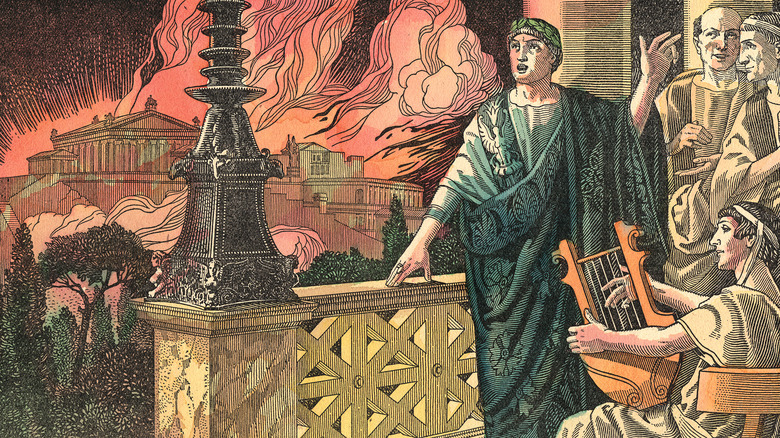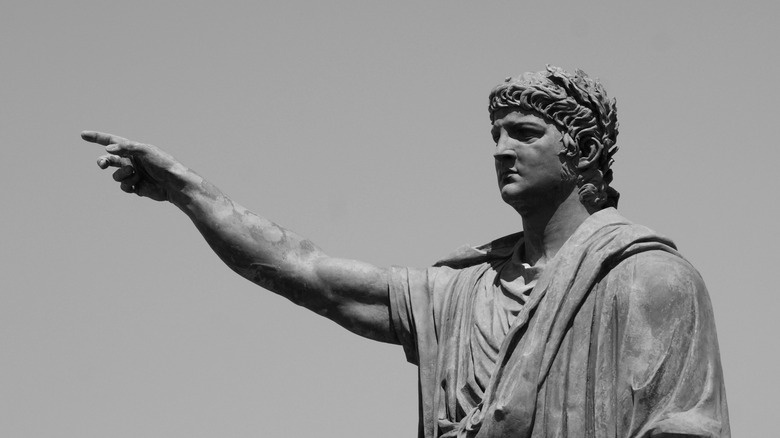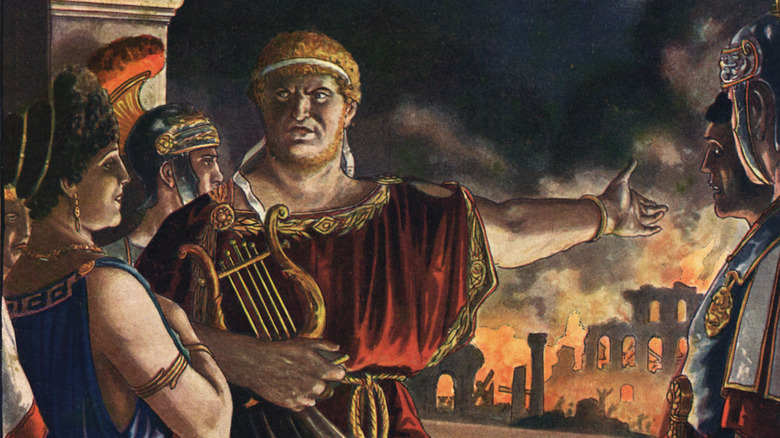Nero Didn't Really Fiddle While Rome Burned. Here's Why
Being an ancient Roman emperor is perhaps one of the most illustrious jobs in history. The empire was famed for its decadence and influence, and the emperors were at the heart of it all. They wielded tremendous power, were hand-fed all the grapes they could ever desire (according to popular culture), and were feared and revered by millions.
Needless to say, much has been written about the emperors of Rome, both by contemporary sources and those that followed in the centuries since. They were a colorful lot by all accounts, notorious for a wide range of misdeeds, extravagances and everything in between. Some of these tales, however, are untrue.
As Britannica reports, Caligula did not give his beloved horse the position of consul after all (though he may have intended to). The equally-infamous Nero had a few very well-known tall tales written about himself too. As it turns out, Nero did not fiddle while Rome burned after all, and there are some very good reasons why he didn't.
Nobody, it seems, fiddled in Ancient Rome, during devastating fires or otherwise. According to Britannica, the instrument was only invented centuries after Nero's death, in medieval Europe. If we are to take the expression literally, then, it's clear that Nero couldn't possibly have played a fiddle while Rome burned around him.
A responsible or opportunistic ruler?
Instead, then, did the emperor behave in a callus and aloof fashion as Rome burned? Is the saying metaphorical? It seems that possibility is heavily contested too. Per History, a tremendous fire devastated the city in A.D. 64. Over the course of almost a week, over two-thirds of Rome burned down. It's at such times of horrific crisis that citizens turn to their leaders for support, and it seems that Nero did his best to offer it. When the news reached him, he left Antium and returned to Rome, where he reportedly started to coordinate efforts to alleviate the crisis and save what could be saved.
History Today states that during the Great Fire of Rome that fateful July, Nero introduced such measures as cutting the cost of supplies and bringing in food from nearby towns in an effort to support the people. There were accusations, however, that he may have opportunistically arranged the fire himself, as a chance to stage more of his theatrics.
Per History Today, the so-called Golden House was constructed on Nero's orders in the wake of the fire. This was a luxurious new building, perfect for an emperor who suddenly and conveniently had a lot of room to expand in the devastated city.
Conflicting accounts and conspiracy
Sky History states that Roman historians Suetonius and Cassius Dio, writing more than 60 years and one century after the event respectively, suggest that Nero had planned the fire, and paid groups to sabotage any attempt to extinguish it. He had reportedly announced plans to renovate great swathes of the city with buildings and sculptures in his own honor. These plans were not approved, it seems, and the timing of this (shortly before the fire) is more than a little suspect.
In his "The Annals," Cornelius Tacitus writes (per Perseus) that Nero's attempts to aid the people "produced no effect, since a rumor had gone forth everywhere that, at the very time when the city was in flames, the emperor appeared on a private stage and sang of the destruction of Troy, comparing present misfortunes with the calamities of antiquity."
Ultimately, there are several different versions of the story of the Great Fire of Rome, and we will probably never know whether the emperor himself truly had a hand in it. It is known, however, that he was fond of putting on elaborate performances which the people felt were unbecoming of his lofty position (per Britannica). He was also a fond lyre player, but did he indulge this hobby as Rome burned? Perhaps he did, perhaps he didn't, but he certainly didn't play a fiddle during the tragedy.


